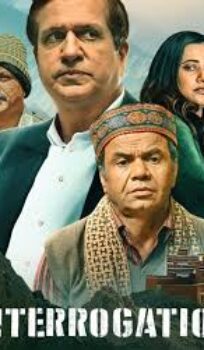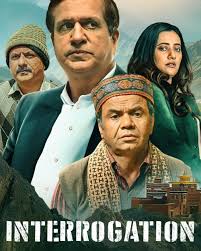
Synopsis
When you lock a few people in a room and start peeling away their secrets, the truth can be far more dangerous than a gun. That’s exactly what Interrogation (2025) delivers — a tight, suspense-driven Hindi thriller that keeps you guessing until the very last frame.
Storyline Overview
The film opens with a shocking discovery — a retired judge is found dead inside his home under mysterious circumstances. No signs of forced entry, no visible struggle. Yet something feels disturbingly off.
Soon, four people who met the judge that same day are brought in for questioning. Each has a connection to the victim, and each carries a shadowy motive. The story unfolds almost entirely within the confines of the interrogation room, where lies, half-truths, and suppressed emotions explode one by one.
As the police dig deeper, every suspect begins to look guilty — and that’s where the film hooks you. The more you listen to their stories, the harder it becomes to separate innocence from manipulation. What starts as a simple murder inquiry turns into a psychological battlefield of guilt, revenge, and buried sins.
Cast and Performances
The movie features a strong ensemble cast:
-
Manu Singh plays Vishal, a composed yet unpredictable young man who seems to know more than he admits.
-
Darshan Jariwala portrays the late judge, whose character is central even in death.
-
Rajpal Yadav delivers a memorable turn as Bansilal, adding dark humor and tension in equal measure.
-
Yashpal Sharma and Girish Kulkarni bring raw intensity to their roles, both veterans in portraying morally complex men.
-
Ritooja Shinde gives the film its emotional core, balancing vulnerability with grit.
-
Abhimanyu Singh appears in a strong supporting role that ties the story’s loose ends.
Every performance contributes to the film’s atmosphere — understated yet unnerving. There are no over-the-top monologues here, only sharp exchanges and unspoken tension that builds scene by scene.
Direction and Screenplay
Directed by Ajoy Varma Raja, Interrogation (2025) thrives on minimalism. The story doesn’t rely on grand sets or action sequences — instead, it uses confined spaces, silence, and camera focus to trap both characters and viewers in a web of suspense.
The screenplay by Krishnaprasad Somanathan, Harsh Shah, and Ajoy Varma Raja is layered with subtle misdirection. Each suspect’s testimony adds another piece to the puzzle, only for it to crumble moments later. The pacing is deliberately slow at first, then quickens as revelations unfold — keeping the tension simmering until the explosive finale.
Cinematography and Music
Cinematographer Vishnu Panickar deserves special mention. His use of shadows, tight framing, and muted color palettes amplifies the claustrophobic feel of interrogation sequences. Every flicker of light or change in angle feels intentional — mirroring the shifting truths of the story.
The background score avoids loud jumpscares. Instead, it relies on subtle notes that rise when lies crack open and fall into silence when a confession looms. This minimalist sound design helps sustain unease throughout the runtime.
Production and Setting
Interrogation was filmed mostly in indoor sets designed to resemble a real police investigation facility. A few outdoor shots, reportedly taken in Ladakh, provide short breathers between intense sequences. The film’s production team focused on authenticity — from the positioning of interrogation tables to the tone of official dialogue.
The runtime sits around 95 minutes, which feels just right. It’s long enough to explore every suspect’s story, but short enough to keep the suspense tight and engaging.
Themes and Symbolism
At its core, Interrogation isn’t just about finding a killer — it’s about confronting truth itself.
The film explores how guilt wears many faces, and how the human mind twists morality to survive. Each character’s version of the truth is shaped by fear, pride, and survival instincts. This psychological complexity elevates the movie from a routine whodunit to a moral puzzle.
It also highlights the fine line between justice and judgment — a fitting irony given that the victim was a retired judge. The story questions whether truth is ever absolute, or just a perspective wrapped in circumstance.
Strengths
-
Compact storytelling: The film doesn’t waste a single frame. Every dialogue matters.
-
Strong performances: The ensemble cast brings authenticity and emotion to an otherwise dialogue-heavy setup.
-
Tight direction: The confined setting becomes an asset rather than a limitation.
-
Cinematic tension: Use of silence, facial expressions, and camera movement builds a continuous sense of unease.
Weak Points
While the movie is gripping, it’s not flawless:
-
Some might find the pacing slow in the middle act.
-
A few twists are predictable if you’re a seasoned crime-thriller watcher.
-
The film could have dug deeper into the emotional stakes of the suspects beyond their testimonies.
Still, these are minor bumps in an otherwise well-crafted psychological thriller.
Why “WEB-DL” Matters
When the movie is referred to as Interrogation (2025) Hindi WEB-DL, it simply means it’s the high-quality digital version available on streaming platforms. The format retains full visual and sound quality from the original digital source — ideal for online viewing. It’s not a theatrical rip or low-resolution copy, but a clean digital print meant for legitimate streaming distribution.
Final Verdict
Interrogation (2025) is a welcome addition to India’s growing list of smart, dialogue-driven thrillers. It proves you don’t need extravagant budgets to create tension — just sharp writing, committed performances, and a camera that knows when to stay still.



